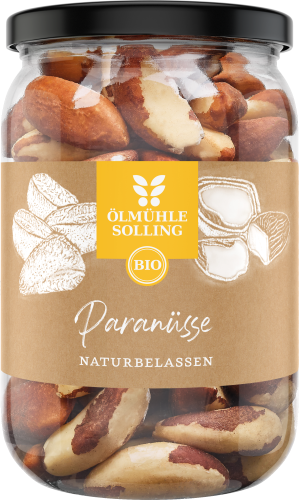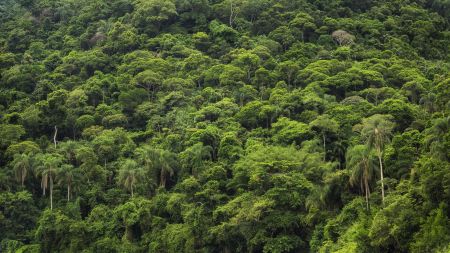ORGANIC Brazil nuts
unroasted


- Natural and unroasted
- sustainably packaged in a jar with a screw cap
- from controlled organic cultivation
- with valuable fiber
- for refining muesli and salads
- Cover your selenium requirement with 2 Brazil nuts per day
from 493 ratings
The natural Brazil nuts come from controlled organic cultivation and contain valuable monounsaturated and polyunsaturated fatty acids. They also contain many minerals. As Brazil nuts contain vegetable protein, they are well suited to a vegetarian or vegan diet.
Harvesting Brazil nuts
Brazil nuts, which are known by many other names (e.g. Brazil nut), ripen on the Brazil nut tree, whose botanical name is Bertholletia excelsa. This tree grows exclusively in the tropical rainforest and is mainly found in the Amazon region of South America. The largest exporter of Brazil nuts is Bolivia, but Brazil and Peru also produce some of the Brazil nuts destined for the foreign market.
Brazil nuts grow wild and cannot be cultivated on plantations. The Brazil nut tree, whose name is derived from the Brazilian state of Pará, takes around 20 years to bear a significant amount of fruit for the first time - too long for plantation owners who want to earn money quickly with their agricultural produce. The second reason, however, is more important: the trees are pollinated by a single species of bee, which is a species of magnificent bee and is only found in the Amazon rainforest. This species of bee cannot be kept on plantations. As a result, Brazil nut trees can only be found in intact tropical rainforests. The commercial use of Brazil nuts therefore contributes to the preservation of the rainforest.
It can take up to 14 months for a ripe Brazil nut to develop. The harvest period runs from January to March. Ten to 16 Brazil nuts ripen in one capsule at the same time. What we call Brazil nuts in Germany are the seeds of the Brazil nut tree, not the actual nut fruits. A Brazil nut fruit is a capsule about 10 to 16 cm in size, which is encased in a hard shell. This shell contains up to 30 of the seeds, known as Brazil nuts, which have three edges and are also surrounded by a hard shell. This must first be cracked in order to get to the approx. 4 cm large seeds.

 Brazil nut trees grow exclusively in the rainforest
Brazil nut trees grow exclusively in the rainforestThe Brazil nut tree
Brazil nut trees belong to the jungle giants. They can be up to 500 years old and up to 50 meters high. Their trunks reach a circumference of up to five meters and their crowns often tower above the other trees in the rainforest. The leaves of the Brazil nut tree grow up to 60 centimetres long and its large, yellow flowers are so deep that they can only be pollinated by magnificent bees, as only their tongues have the right length to reach into the flowers. As this type of bee only lives in the tropical rainforest, every attempt to cultivate the Brazil nut tree in other regions of the world has so far failed for this reason. The nut fruits, which are surrounded by a thick, hard shell and take around 15 months to ripen, can weigh up to 1.5 kilograms and fall from the trees during the harvest period between December and March.
As the trees are scattered throughout the rainforest, this also means that the collectors sometimes have to travel long distances to reach the Brazil nuts. The poaching of Brazil nuts is not entirely without danger, as the collectors have to be careful not to be hit by a falling nut. They then have to break open the hard capsules of the nuts by hand to get to the seeds.
In various areas of the Amazon, the poaching of Brazil nuts is one of the most important sources of income for the people living there. The local population therefore has a heightened interest in protecting and preserving the rainforest and thus the Brazil nut trees. The economic use of Brazil nut trees thus makes an important contribution to the preservation of tropical forests.
Taste and use
Thanks to their slightly sweet taste, they go well with desserts, cakes and pastries. However, Brazil nuts can also be used to prepare salads, fish and vegetables. They are also used in cosmetics, the production of sweets and oil. With their high protein content, Brazil nuts are a valuable food, especially when other sources of protein are difficult to obtain. It also provides numerous vitamins and minerals and, of course, large amounts of unsaturated fatty acids.
Recommended daily intake
Brazil nuts have a particularly high selenium content. 100 g Brazil nuts contain approx. 103 μg selenium. The German Nutrition Society recommends not exceeding a daily intake of two Brazil nuts. This amount can already make a contribution to the selenium supply. Further information can be found on the homepage of the German Nutrition Society (Deutsche Gesellschaft für Ernährung e.V.)





